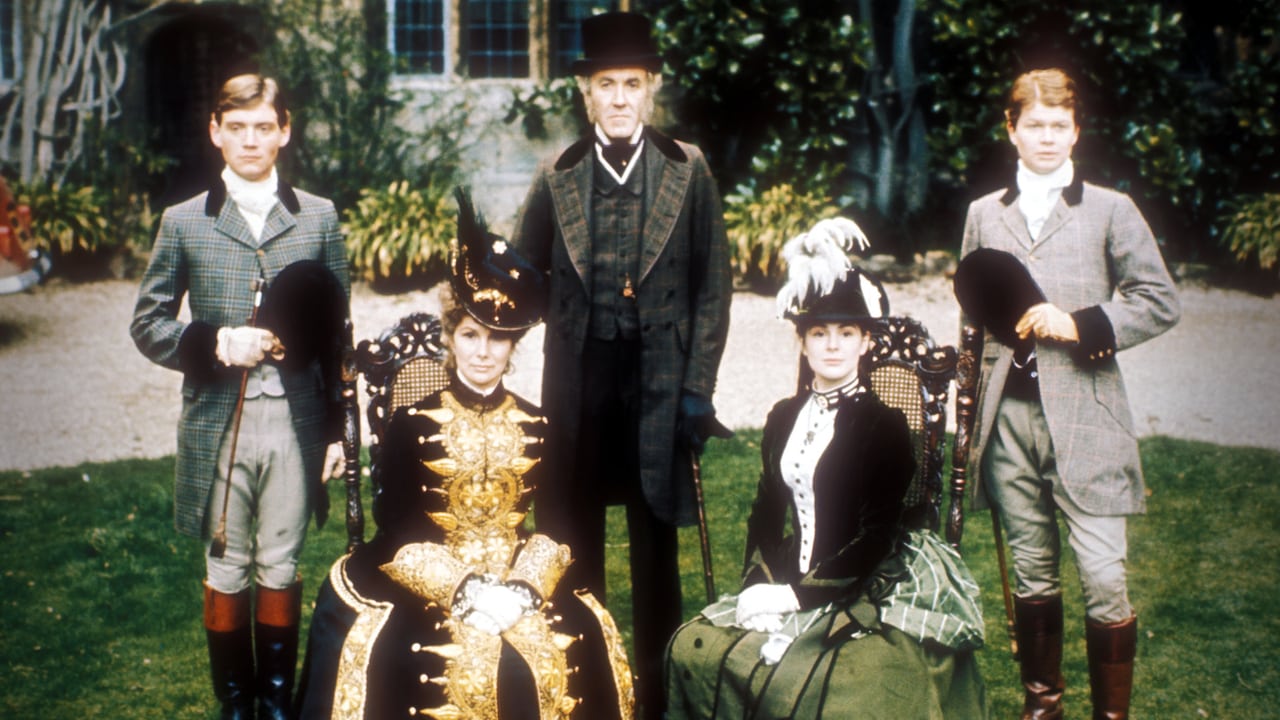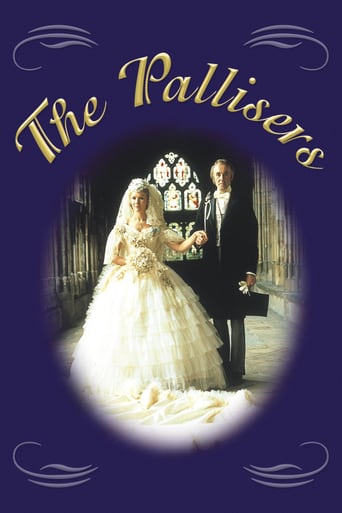

This series deals with the second series of novels by Anthony Trollope that people recall when thinking of his novels. They are the six novels making up the story of Plantagenet Palliser's political rise and fall from Can You Forgive Her" through "The Prime Minister" and "The Duke's Children". Plantagenet (Philip Latham) is the nephew and heir of the Duke of Omnium and Gatherum (Roland Culver) who is England's richest nobleman (his estates, by the way, are in Barset). We watch Plantagenet (a Whig, and something of a currency reformer - he is trying to push a decimal currency in 19th Century England, so he is a century ahead of his time there) pursues Lady Glencora (Susan Hampshire) in the first story, where she is tempted by a more raffishly attractive lover Burgo Fitzgerald. After their marriage, the story turns attention to Phineas Finn, "the Irish Member"(Donal McCann), and his sexual political problems with two women, one of whom is Madame Max Gestler (Barbara Murray), the girlfriend of the Duke of Omnium. The third novel dealt with Lizzie Eustace (Sarah Badel), her romances with Lord George (Terence Alexander), Reverend Emilius (Anthony Ainsley), and the inept Lord Fawn (Derek Jacobi), and her plotting to maintain possession of "the Eustace Diamonds" (Trollope spoofs Wilkie Collins here). The fourth novel deals with again with Finn (the novel was "Phineas Redux"), and his final choice for a wife, as well as his trial for murder (the murder of a political rival - the real murderer is revealed by a witness who is from Bohemia and has to be cross-examined in Latin). The fifth novel follows Plantagenet (now Duke of Omnium) reaching the top of Disraeli's "greasy pole" (he is Prime Minister, but in a minority coalition government), and discovering that he can't get his favorite currency reform through. "The Duke's Children" dealt with the problems of Plantagenet and Glencora with their children, in particular their son Lord Silverbridge (Anthony Andrews), and how the family is brought together by the death of Glencora.Trollope's strength was in being honest and painstaking in trying to describe the reality of the world. If you read "The Eustace Diamonds", Lizzie has gotten physical control of the jewelry when married to the previous Lord Eustace. But was this just temporary as long as her husband was alive, or was it permanent? There is a long chapter in the novel dealing with the British laws regarding family heirlooms that was based on legal advice Trollope sought from a solicitor to make the novel as accurate as possible. He was one of the few writers of his day to go to such elaborate lengths.That chapter is not done in detail in the series, but the stories keep quite close to what Trollope did. The series shows the political world of that day (and really of any day) where the personalities are mixed, and you may need to work with really obnoxious types. In "Can You Forgive Her?" Glencora gets to meet a political figure who is on the lowest level of the Whig Party. The man is not a bad man, but he happens to get on her bad side. Plantagenet tries to correct this misunderstanding of him, but he does not succeed. When, in a general election, the poor man loses, Glendora celebrates! Bigotry appears in various guises, most notably in the career of Finn, and his Irish heritage (he meets with contempt from the newspapers and some of the leaders for that reason). His need for a wealthy wife eventually crosses his path with Madame Max, who is Jewish. Yet she is tolerated more than Phineas - she has a protector in her lover the Duke of Omnium.For a good introduction to the series of novels, the series of episodes could not be beat. Well acted, and well produced, it was a good introduction or sequel to "The Barset Chronicles" (which was produced in the 1980s, but those novels were printed first. If you can see it, you will agree to my high opinion on it.By the way, at one point one of the characters is in jail, and is visited by his friend Dolly Longstaffe (Donald Pickering). Longstaffe is looking at some books that have been sent to the character, and reads the titles like "The American Senator", "An Old Mam's Love", and smiles, and says "I see the old fellow's still turning them out!". Yes - the "old fellow" is Anthony Trollope.
... View MoreAs an adaptation of Anthony Trollope's brilliant Palliser series, I fail to see how this production could have been any worse. What appears to have happened (this is pure speculation) is that someone unfamiliar with Trollope's work hired novelist Simon Raven to write the series, and Raven decided that Trollope didn't know how to tell his own stories and that he -- Raven -- would tell better ones using the same character names.For those who have read the books, here is a partial list of reasons why you should steer very clear of this regrettable "adaptation" (spoilers ahead). The following appalling things happen in the TV series: Phineas Finn is sleeping with Mary Flood Jones, and marries her only because she gets pregnant.The love between Plantagenet Palliser and Lady Dumbello is based entirely on their mutual interest in decimal coinage.Lady Glencora gets a big long death scene.Dolly Longstaffe is a friend of Lady Glencora's.The elder Duke of Omnium is a dirty old man who pinches his nurse.Burgo Fitzgerald is ugly, and for some bizarre reason, he and his aunt appear to be on the verge of going to bed together.Almost all of the casting is way off the mark.All of that delicious, true-to-life dialog, that is a large part of the fun of reading Trollope and that adapts so well to the screen, has been eliminated, and replaced with glib pseudo-witticisms and cheap innuendos.All of the novels' thoughtful and searching treatment of character has been drained away and replaced with a lot of utterly uninteresting people in drably sensational situations. The plots have been altered and the emotional interest removed entirely.This is a very, very incomplete list of things Raven changed -- not one of them for the better. Raven also added no end of scenes of stupid hijinks which not only are not in any of the books, but are not engaging in any way themselves.All told, this production is a shabby and disrespectful treatment of some truly great novels, and has little merit as anything else. I was excited when I first found out that the Pallisers had been adapted for the screen as a miniseries. I figured, with such great material to work with, how bad can it be? The answer is, *astoundingly* bad. If you admire Trollope even dimly, stay very far away from this utter stinkbomb. If you want to see a Trollope novel adapted to the screen with both fidelity and artistic competence, see Masterpiece Theatre's recent production of *He Knew He Was Right*.
... View More"The Pallisers" is a visual retelling of six sequential novels of Anthony Trollope dealing with the Palliser clan through a couple of decades in the nineteenth century.The novels have been truncated (for instance, the whole triangle of Mr. Cheeseacre, Mrs. Greenow and Captain Bellfield has been excised from the part covering CAN YOU FORGIVE HER?) but Trollope always was too baggy and needed trimming. And for Trollope fanatics, they do trot Griselda Grantley into the first episode.What remains is so sprawling, Barrington Erle and Dolly Longstaffe (a slight character in the Palliser novels!) are used, individually and in tandem, as a running Greek Chorus through the series. This is a controversial decision, but Moray Watson's Erle is a likable and perhaps absent-minded consummate political insider; while Donald Pickering's Dolly -- acting the lackadaisical, foppish man-about-town -- shows deeper waters running in him than the Dolly from THE WAY WE LIVE NOW. Though this series was made in the days when this kind of show was performed like a videotaped play, crude effects and rear photography do not interfere with the quality of the production. The sets and costumes are gorgeous and all the exterior party scenes look great.What "The Pallisers" lacks in effects, it more than compensates for in the acting department.The show is carried by beautiful Susan Hampshire as Lady Glencora and the sometimes inaudible Philip Latham as Plantagenet Palliser. It's full of solid British actors -- old timers like Roland Culver, Basil Dingham and Roger Livesey, and up-and-comers like Derek Jacobi, Penelope Keith, Anthony Andrews and Jeremy Irons. Stockpiled with notable British actors in small parts, American viewers will recognize Edward Hardwicke of "Sherlock Holmes" and Peter Sallis of Wallace and Gromit amongst others.Mystery writer John Dickson Carr once had a character ask, "What if Trollope wrote like Dickens?" Well, Dickens was the better word smith, his writing has greater charm, his characters spring more off the page. His stories were better, his various plots dovetailed better than Trollope's do, and when Dickens is truncated the stuff that is excised is often so good it's missed.Yet Trollope's lesser genius seems to adapt better for television. When Dickens is done accurately, his characters are almost too grotesque on the small screen (see the family of Wackford Squeers in the Nigel Havers "Nicholas Nickleby." Trollope's books are packed with pages of yawn-inducing material this is much more dispensable than anything from Dickens. Trollope's many ill-defined, throw-away characters can be thrown away, and those who remain, sometimes more definable by their names than their characters on the page, seem more suitable for television because they're not larger-than-life. An amorphous mass of literature like Trollope's six Palliser novels can be more properly shaped for television installments than Dickens by judicious pruning.There's a lot of nipping and tucking of Trollope in "The Pallisers", and that's a good thing. The individual novels, as dramatized, flow from story to story like a Victorian soap opera as characters age, die, are born, have flings, get married, get elected, and so forth."The Pallisers" is a long-term commitment that may not suit today's shorter attention spans, but it still can be addictive; and DVDs make it a far cry from the days before normal houses had videotape recorders and viewers had to be on the spot every week for 26 weeks to see this solid saga unfold.
... View MoreThey really don't make them like this any more - nearly 20 hours of TV devoted to six Trollope novels. The costumes are fabulous, the sets lavish, the acting superb. The whole is set around the characters of Lady Glencora Palliser (Susan Hampshire) and her husband, Plantagenet (Philip Latham), who string the various stories together more or less loosely. We start out with a miserable and rebellious Glencora and her arranged marriage with Plantagenet, follow the tale of Alice Vavasour and her suitors, then continue with Phineas Finn and his turbulent life. On to the wicked Lizzie Eustace, back to Phineas and then on to poor Emily Wharton. The last chapter is about the Duke's children, Silverbridge, Mary and Gerald. Around these central characters you have a huge cast of supporting characters, every one of them beautifully portrayed. The series has stood the test of time very well indeed, probably because they did it all well to begin with - the costumes all authentic and hand made, no zippers here! What a delight.
... View More